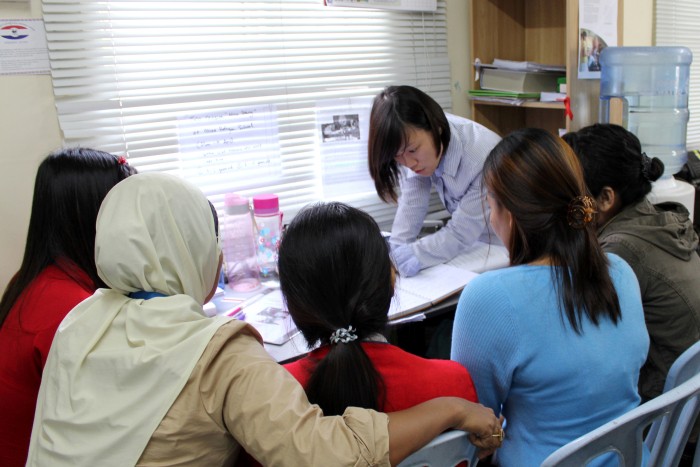
Volunteers joining the Refugee Women’s Protection Corps are trained and coached by Jackie Loo, Head of ICMC’s Office in Malaysia. The group is learning about ICMC Children’s Safety Program. The Refugee Women’s Protection Corps was one of 64 projects featured in the report. Photo courtesy of ICMC.
A team of researchers from the Boston College School of Social Work’s (BCSSW) Center for Social Innovation delivered a research report to the philanthropic network Foundations and Donors Interested in Catholic Activities (FADICA) that offers a working definition of “Catholic social innovation” and highlights 64 examples of such work in response to the global refugee and migrant crisis. FADICA commissioned the research, led by Professor Tiziana Dearing, as part of its own initiative to define Catholic social innovation and raise awareness among its members and the broader community about how Catholic social innovation is being used to address today’s pressing social problems.
“FADICA offered our team a wonderful challenge with this research, to combine tenets of Catholic Social Teaching and Catholic values with principles of social innovation in order to see if something specific, unique was happening,” explains Dearing. “We were also challenged by the size and scope of the global refugee and migrant crisis and the wide range of Catholic-based activities happening in response. It stretched us on both the theory and practice sides, and we tried to approach it with great humility as a result.”
The BCSSW team, which included MSW candidates Samantha Allen, Bethany Schmid, and Maria De Las Nieves Edwards Cosmelli, adopted a mixed methods approach to their work. To begin, they took an inventory of existing Catholic and Catholic Sister-led organizations working with refugee and migrants, narrowing the scope of their project to focus on the 32 countries worldwide that have higher than average flows of refugees across their borders. They then provided online surveys to small in-country organizations, conducted interviews with staffers at larger multinational entities, and coded and analyzed the data.
“Dearing’s team developed a rigorous research process to address these difficult design issues,” explains BCSSW Associate Dean of Research David Takeuchi. “The results of this systematic data collection provides a substantial foundation that helps define Catholic social innovations and identify trends that will be critical to focus on in the near future.”
Dearing’s report highlighted more than sixty programs engaged in some form of Catholic social innovation, including Little Ripples, a partnership in Chad between Jesuit Refugee Services and an NGO called i-Act that works to help those individuals affected by mass atrocities. Thirty-four projects identified are led by Catholic sisters, for example the Good Shepherd Sisters Projects for Peace in Lebanon, which provides services to cultivate the peaceful integration of migrants into Lebanese society. The report also identified key trends in the refugee and migrant crisis as highlighted by the organizations surveyed and interviewed.
“For decades—and sometimes centuries—Catholic sisters, priests, brothers, and lay people have been harnessing social innovation to help communities flourish and serve people on the margins,” said Alexia Kelley, the President and CEO of FADICA. “The research reveals this reality, highlighting over sixty examples of it across the globe. It invites all of us—Catholic and non-Catholic alike—to learn how to better recognize and support Catholic social innovation.”
For more information, we encourage you to visit FADICA’s website to read the report’s findings in full.

